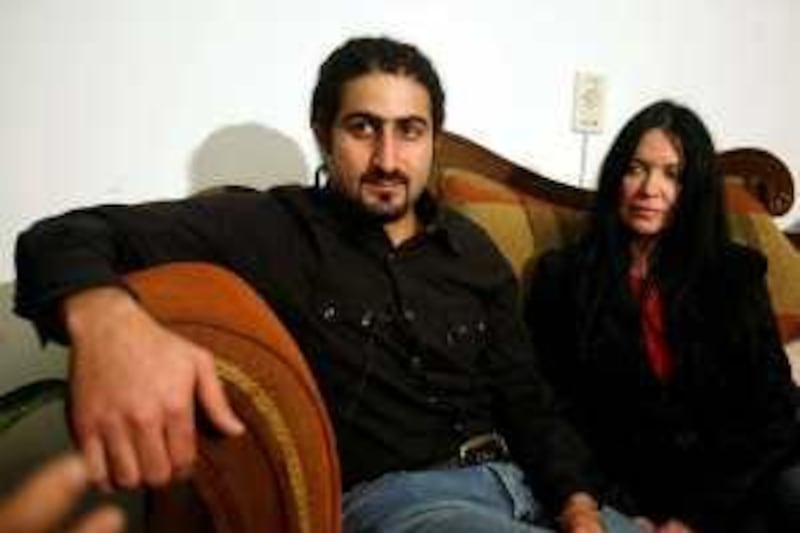What must Osama bin Laden make of the bizarre, limbo-like existence of a dozen of his grandchildren in Iran, a Shia-led country he despises? The al Qa'eda leader has never seen most of them. All under 11 years of age, eight were born under house arrest in the Islamic republic, where seven of his children were detained after fleeing neighbouring Afghanistan about the time of the September 11 attacks on the United States.
In all, 30 bin Laden family members and in-laws live under tight security at a walled compound comprising 20 houses in Tehran. They have a swimming pool, televisions, PlayStations and computers. There is no internet and only rare and recent access to telephones, which are brought in by guards who monitor calls. Occasionally they get out on shopping trips, under guard. Cocooned from society, none speaks Farsi after nearly a decade in Iran: they know only Arabic. The children have had little or no education.
Fascinating details of their constricted, if comfortable, lifestyle in Tehran were provided in interviews and a statement sent to The National by the al Qa'eda leader's fourth-eldest son, Omar, 29, and his British-born wife, Zaina Alsabah-Binladin, 55. Iran is willing to let the group leave, but "the Iranian government has nowhere to send Omar's other siblings", the couple wrote. "We beg of any country to help us, either from the east or the western world.
"These are just as much innocent victims as anyone else." None has al Qa'eda sympathies, the statement says. "None of the siblings liked war or violence, all they ever wanted was a normal life with a normal family. They all wanted peace." There had been uncertainty for years over the whereabouts of some of bin Laden's closest relatives, who were reported to have fled to Iran in 2001. Omar bin Laden was unsure whether his brothers and sisters were still alive until they called him in November. Iran has never officially acknowledged their presence.
Seven of Osama bin Laden's children and one of his wives arrived in Iran in late 2001. The eldest of the children, Saad, was 20 at the time; Ossman, 17, Mohammad, 15; Fatima, 14; Hamza, 12; Iman, nine, and Bakr, seven. "It was a dreadful journey that took them weeks, sleeping anywhere they could find shelter," the statement says. They travelled on Sudanese passports with altered names that concealed their real identities. The documents were issued in Sudan where Osama bin Laden lived before he was expelled and moved to Afghanistan.
The group lived "happily for a few months" in an apartment in Iran before the Iranian authorities discovered they had entered the country illegally, without proper identification documents, and arrested them. Bin Laden's youngest son, Bakr, now 16, was allowed to leave Iran on December 25 when he flew to Damascus, where he was reunited with his Syrian mother, Najwa al Ghanem, one of the al Qa'eda leader's several wives.
On March 17, Bakr's sister Iman, who had been living at the Saudi Embassy since November after giving her compound guards the slip during a shopping trip in Tehran, also flew to Damascus. Ghanem was allowed to fly to Iran - where she was put up at a hotel - to escort Iman, 17, to Syria. The mother and daughter had not seen each other for nine years. "The Iranians had made us a promise [to allow Iman leave] and they kept to their promise," Omar and Zaina's statement says.
Saad bin Laden, the eldest of the al Qa'eda leader's sons in Tehran, managed to flee Iran early last year, hoping to seek help for those left behind, the couple said. Omar has not heard from him since and does not know if his brother is alive or dead. In January last year, US officials said Saad bin Laden was probably in Pakistan. The US treasury department slapped sanctions on him, accusing him of involvement in terrorism and of helping to manage al Qa'eda from Iran. There were unconfirmed reports last July that he had been killed in a US drone attack in Pakistan.
Zaina Alsabah-Binladin rejected the US allegations against Saad bin Laden as "absolute rubbish". She described him as an innocent and jolly character, "incapable of harming a soul". It was absurd to suggest any of the bin Ladens in Tehran were involved in al Qa'eda, she said, speaking from her home in England. "They're guarded and have no communication with the outside world. It's not only that - Iran doesn't support al Qa'eda." She also rejected suspicions voiced by US officials that Iran had allowed Saad bin Laden to escape.
Tehran has long viewed al Qa'eda as a threat, fearing its exremist brand of Sunni radicalism, which is virulently hostile to the Shia faith. In 1998, Iran was on the brink of war against Afghanistan, then controlled by the Taliban, which was sheltering al Qa'eda. Four of the al Qa'eda leader's children remain at the Tehran compound: Osman, Mohammad, Hamza and Fatima. Omar bin Laden robustly rejected recent charges by his half-brother Khalid, whose whereabouts are unknown, that Iran had "beaten and repressed" bin Laden family members in Tehran.
'They're very well treated. The living conditions are good - excellent," Omar and Zaina said, making clear their gratitude to Iran. Most of the al Qa'eda leader's children, including Omar - who has lived in Egypt and the Gulf - live as legitimate businessmen. The extended bin Laden family, one of the wealthiest in Saudi Arabia, disowned Osama in 1994 when the kingdom stripped him of his citizenship because of his terrorist activities.
"The sins of the father do not fall on the children," Omar bin Laden, the author of Growing Up bin Laden, said in an interview from an undisclosed country. He described those in the Tehran compound as "the forgotten victims of 9/11". @Email:mtheodoulou@thenational.ae






